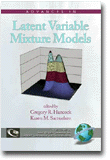
Advances in Latent Variable Mixture Models
By:
Gregory R. Hancock, University of Maryland
Karen M. Samuelsen, University of Georgia
Published 2007
The current volume, Advances in Latent Variable Mixture Models, contains chapters by all of the speakers who participated in the 2006 CILVR conference, providing not just a snapshot of the event, but more importantly chronicling the state of the art in latent variable mixture model research. The volume starts with an overview chapter by the CILVR conference keynote speaker, Bengt Muthén, offering a “lay of the land” for latent variable mixture models before the volume moves to more specific constellations of topics. Part I, Multilevel and Longitudinal Systems, deals with mixtures for data that are hierarchical in nature either due to the data’s sampling structure or to the repetition of measures (of varied types) over time. Part II, Models for Assessment and Diagnosis, addresses scenarios for making judgments about individuals’ state of knowledge or development, and about the instruments used for making such judgments. Finally, Part III, Challenges in Model Evaluation, focuses on some of the methodological issues associated with the selection of models most accurately representing the processes and populations under investigation. It should be stated that this volume is not intended to be a first exposure to latent variable methods. Readers lacking such foundational knowledge are encouraged to consult primary and/or secondary didactic resources in order to get the most from the chapters in this volume. Once armed with the basic understanding of latent variable methods, we believe readers will find this volume incredibly exciting.
CONTENTS
Editors’ Introduction, Gregory R. Hancock and Karen M. Samuelsen. Acknowledgments. Latent Variable Hybrids: Overview of Old and New Models, Bengt Muthen. PART I: Multilevel and Longitudinal Systems. Multilevel Mixture Models, Tihomir Asparouhov and Bengt Muthen. Longitudinal Modeling of Population Heterogeneity: Methodological Challenges to the Analysis of Empirically Derived Criminal Trajectory Profiles, Frauke Kreuter and Bengt Muthen. Examining Contingent Discrete Change Over Time with Associative Latent Transition Analysis, Brian P. Flaherty. Modeling Measurement Error in Event Occurrence for Single, Non-Recurring Events in Discrete-Time Survival Analysis, Katherine E. Masyn. PART II: Models for Assessment and Diagnosis. Evidentiary Foundations of Mixture Item Response Theory Models, Robert J. Mislevy, Roy Levy, Marc Kroopnick, and Daisy Rutstein. Examining Differential Item Functioning from a Latent Mixture Perspective, Karen M. Samuelsen. Mixture Models in a Developmental Context, Karen Draney, Mark Wilson, Judith Gluck, and Christiane Spiel. Applications of Stochastic Analyses for Collaborative Learning and Cognitive Assessment, Amy Soller and Ron Stevens. The Mixture General Diagnostic Model, Matthias von Davier. PART III: Challenges in Model Evaluation. Categories or Continua? The Correspondence Between Mixture Models and Factor Models, Eric Loken and Peter Molenaar. Applications and Extensions of the Two-Point Mixture Index of Model Fit, C. Mitchell Dayton. Identifying the Correct Number of Classes in Growth Mixture Models, Davood Tofighi and Craig K. Enders. Choosing a “Correct” Factor Mixture Model: Power, Limitations, and Graphical Data Exploration, Gitta H. Lubke and Jeffrey R. Spies. About the Contributors.
-
Paperback978-1-59311-847-1
Web price: $45.04 (Reg. 52.99)
-
Hardcover978-1-59311-848-8
Web price: $80.74 (Reg. 94.99)
- eBook9781607526346

- MAT029020 - MATHEMATICS: PROBABILITY & STATISTICS: Multivariate Analysis
- EDU015000 - EDUCATION: Higher
- EDU037000 - EDUCATION: Research
-
 (Re)Envisioning Social Studies Education Research
Current Epistemological and Methodological Expansions, Deconstructions, and Creations
(Re)Envisioning Social Studies Education Research
Current Epistemological and Methodological Expansions, Deconstructions, and Creations
-
 Affirming Identity, Advancing Belonging, and Amplifying Voice in Sororities and Fraternities
Affirming Identity, Advancing Belonging, and Amplifying Voice in Sororities and Fraternities
-
 Effective Alternative Assessment Practices in Higher Education
Effective Alternative Assessment Practices in Higher Education
-
 Expanding the Vision of Faculty Learning Communities in Higher Education
Emerging Opportunities for Faculty to Engage Each Other in Learning, Teaching, and Support
Expanding the Vision of Faculty Learning Communities in Higher Education
Emerging Opportunities for Faculty to Engage Each Other in Learning, Teaching, and Support
-
 Institutional Diversity in American Postsecondary Education
Institutional Diversity in American Postsecondary Education
-
 Promoting Equitable Classroom Practices in Higher Education
Approaches Beyond Curriculum
Promoting Equitable Classroom Practices in Higher Education
Approaches Beyond Curriculum
-
 The Handbook for Aspiring Higher Education Leaders
The Handbook for Aspiring Higher Education Leaders

